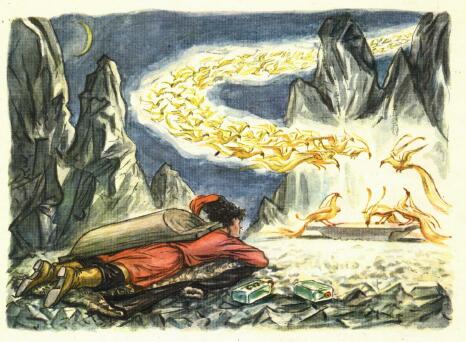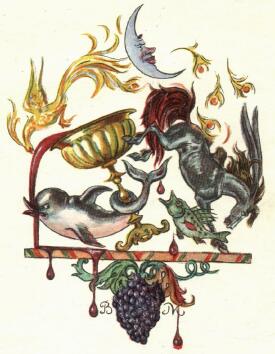Following this thread : Dead birds keep raining down
http://www.cassiopaea.org/forum/index.php?topic=4771
I wished to start this new topic about possible connections between birds and consciousness. The post is rather long and its content is merely made of assumptions. I hope it’s not a loss of time.
The higher consciousness might the same thing as the spirit or the soul, according to the Cs :
See this picture for example : http:(doubleslash)www.cwrl.utexas.edu/~bump/fr/chimerie/SC/Jesus.jpg
In Christian tradition, the Holy Spirit is linked to the Baptism :
Here’s a picture of Jesus Christ receiving water on his head and with the Holy Spirit just above : http:(2slsh)content.answers.com/main/content/wp/en-commons/thumb/8/80/180px-Piero_della_Francesca_045.jpg
From : http:(2slsh)www.religion-cults.com/spirit/baptism.htm
"baptism with, or in, the Holy Spirit" is mentioned 7 times in the NT:
- By John the Baptist, 4 times: Mat.3:11, Mk.1:8, Lk.3:16, Jn.1:33.
- By Jesus in Act.1:5.
-By Peter in Act.11:15-17.
- By Paul in 1Cor.12:13…
Paul here is clearly talking about the Sacrament of Baptism "in" the Holy Spirit.
Jesus and Peter are talking about the baptism "with" the Holy Spirit, as in Pentecost of Acts
John the Baptist mentions twice "in" (Mt. and Mk.), and twice "with" the Holy Spirit
The Cs also mentioned the role of water (symbol of the Baptism) in the alchemical Work (i.e. “birth" of the Spirit, development of the higher centers, crown chakra)
(see this picture for example : http:(double slash)aibi.gospelcom.net/ebooks/holy_spirit_studies.htm
The Cs also described this “link between the spirit/soul and the body"
Not only Christianity seemed to link the Spirit to birds. Castaneda also describes a couple of times Don Juan looking at the direction the birds follow, it worked for him like an Oracle.
Oracles seem to tap into this “realm" that is behind time
In mythology, there is at least another story mentioning an eagle. It’s the Prometheus myth :
According to literature about nutrition, liver is the food displaying the highest iron concentration (http:(2slsh)health.allrefer.com/alternative-medicine/iron-12.html)
And the Cs emphasized a couple of time the role of iron in the development of higher centers. See this transcript for example :
14. He gave them the tablet of the gods, the liver, a secret of heaven and underworld,
…
29. he may approach the presence of Shamash and Adad where liver inspection and oracle (take place)." W.G. Lambert, "Enmeduranki and Related Matters," 132
So one could interpretate differently the story of the Eagle Ethon (consciousness ?) eating Prometheus liver (developing thanks to iron ?)
Acts 19 : “ Twelve disciples of John at Ephesus received the fuller revelation of Christ and were baptized and then the Spirit "came upon" them and they spoke in tongues and prophesied (v. 1-6).
And also why the Alchemist’s were calling their universal symbolic language the “Bird’s language" i.e. a language/a communion of the higher centers, a kind of collinear objectivity.
http://www.cassiopaea.org/forum/index.php?topic=4771
I wished to start this new topic about possible connections between birds and consciousness. The post is rather long and its content is merely made of assumptions. I hope it’s not a loss of time.
Communication with higher being can reminds us of Laura’s experiencesession 000219 said:Q: Is it the case that some of them communicated with higher density beings via Stonehenge, and that these communications they received...
A: Stonehenge used to resonate with tonal rill, teaching the other wise unteachable with wisdoms entered psychically through crown chakra transceiving system.
Knowing that the body, the intellect, the emotions are unpermanent, the only entity that might be behind linear time, ie connect the present you and the future you could be the higher consciousnesstruth or lies said:The Cassiopaean Communication was only a part of this process. Looking back on this experiment in accessing "higher consciousness"… So it isn't too much of a stretch to say that the material that came "from the C's," who clearly stated "we are YOU in the future," was merely a similar process.
The higher consciousness might the same thing as the spirit or the soul, according to the Cs :
Interestingly Christian tradition also mentions a spirit. The Holy Spirit that is usually depicted as a bird, a dove just above the crown chakra of Jesus Christ and also above Mary and the Apostlesession 970607 said:Q: Alright. That reminds me. There are a lot of people
teaching that there are divisions of being as spirit, soul,
consciousness, et cetera. What is the difference between the
spirit and the soul?
A: Semantics.
See this picture for example : http:(doubleslash)www.cwrl.utexas.edu/~bump/fr/chimerie/SC/Jesus.jpg
In Christian tradition, the Holy Spirit is linked to the Baptism :
Here’s a picture of Jesus Christ receiving water on his head and with the Holy Spirit just above : http:(2slsh)content.answers.com/main/content/wp/en-commons/thumb/8/80/180px-Piero_della_Francesca_045.jpg
From : http:(2slsh)www.religion-cults.com/spirit/baptism.htm
"baptism with, or in, the Holy Spirit" is mentioned 7 times in the NT:
- By John the Baptist, 4 times: Mat.3:11, Mk.1:8, Lk.3:16, Jn.1:33.
- By Jesus in Act.1:5.
-By Peter in Act.11:15-17.
- By Paul in 1Cor.12:13…
Paul here is clearly talking about the Sacrament of Baptism "in" the Holy Spirit.
Jesus and Peter are talking about the baptism "with" the Holy Spirit, as in Pentecost of Acts
John the Baptist mentions twice "in" (Mt. and Mk.), and twice "with" the Holy Spirit
The Cs also mentioned the role of water (symbol of the Baptism) in the alchemical Work (i.e. “birth" of the Spirit, development of the higher centers, crown chakra)
In some painting Jesus crown chakra and the holy Spirit are linked by a silver threadsession 971122 said:Q: What is the 'prime matter' of the alchemical process?
A: H2O.
Q: What? (Ark) Water can be in different states.
A: Heavy water.
(see this picture for example : http:(double slash)aibi.gospelcom.net/ebooks/holy_spirit_studies.htm
The Cs also described this “link between the spirit/soul and the body"
Keeping in mind that the kite might symbolise the crown chakra (see this thread : http://www.cassiopaea.org/forum/index.php?topic=5059) As suggested by member of the Cs French group, another link between higher centers / crown chakra can be found in a secondary definition of “kite" : any of several small graceful hawks of the family Accipitridae having long pointed wings and feeding on insects and small animals (from freedictionary.com)session951118 said:So, that wasn't just an OBE, it
was a separation of the soul from the body? Is that different
from astral projection?
A: No.
Q: (L) Do people who have OBE's experience this?
A: With "astral projection" the consciousness level is not as
intense because of "the silver cord" and the shroud of third
density awareness.
Not only Christianity seemed to link the Spirit to birds. Castaneda also describes a couple of times Don Juan looking at the direction the birds follow, it worked for him like an Oracle.
Oracles seem to tap into this “realm" that is behind time
And of course Castaneda extensively mentions the Eagle who according to most of Castaneda’s exegetes symbolises the consciousness.http:(doubleslash)dict.die.net/oracle/ said:The answer of a god, or some person reputed to be a god, to an inquiry respecting some affair or future event, as the success of an enterprise or battle.
In mythology, there is at least another story mentioning an eagle. It’s the Prometheus myth :
So the Eagle called Ethon was feeding on Prometheus liver.wikipedia said:…Zeus in his wrath denied men the secret of fire. Prometheus felt sorry for his creations, and watched as they shivered in the cold and winter's nights. He decided to give his most loved creation a great gift that was a "good servant and bad master". He took fire from the hearth of the gods by stealth and brought it to men in a hollow wand of fennel, or ferule that served him instead of a staff. He brought down the fire coal and gave it to man. He then showed them how to cook and stay warm. To punish Prometheus for this hubris (and all of mankind in the process), Zeus devised "such evil for them that they shall desire death rather than life, and Prometheus shall see their misery and be powerless to succor them. That shall be his keenest pang among the torments I will heap upon him." Zeus could not just take fire back, because a god or goddess could not take away what the other had given.
Zeus was enraged because the giving of fire began an era of enlightenment for Man, and had Prometheus carried to Mount Caucasus, where an eagle (Often mistaken as a vulture) by the name of Ethon (offspring of the monsters Typhon and Echidna) would pick at his liver; it would grow back each day and the eagle would eat it again. In the modern context, this legend led scientists to theorize that the ancient Greeks had discovered that the liver is one of the rare human organs to regenerate by itself spontaneously in the case of lesion.
According to literature about nutrition, liver is the food displaying the highest iron concentration (http:(2slsh)health.allrefer.com/alternative-medicine/iron-12.html)
And the Cs emphasized a couple of time the role of iron in the development of higher centers. See this transcript for example :
In Enmeduranki myth live rand oracle are also relatedsession 980822 said:A: Iron is highly magnetic.
Q: Yes, we know that...
A: Opens doorways or portals.
14. He gave them the tablet of the gods, the liver, a secret of heaven and underworld,
…
29. he may approach the presence of Shamash and Adad where liver inspection and oracle (take place)." W.G. Lambert, "Enmeduranki and Related Matters," 132
So one could interpretate differently the story of the Eagle Ethon (consciousness ?) eating Prometheus liver (developing thanks to iron ?)
If birds symbolize the spirit, we can understand better why the baptism (activation of the spirit) is linked to speaking in tongues,session970816 said:Q: We have the phoenix, cranes, herons, doves, ravens, and all are related somehow to speech or writing Why are all these birds related this way?
A: Pass the test.
Q: What do you mean 'pass the test?'
A: Discover.
Q: Well, writing is related to the words for cutting and inscribing and even shearing and sharks. You called the Etruscans
'Penitant Avian Lords,' who were also 'Templar Carriers.' Is this related to these bird images? Then related to speech, writing and shearing?
A: Pass the test.
Acts 19 : “ Twelve disciples of John at Ephesus received the fuller revelation of Christ and were baptized and then the Spirit "came upon" them and they spoke in tongues and prophesied (v. 1-6).
And also why the Alchemist’s were calling their universal symbolic language the “Bird’s language" i.e. a language/a communion of the higher centers, a kind of collinear objectivity.


